We recently named the Canon EOS M200 our top choice for cameras under $ 500, and we’re recognizing it again – this time as the best easy-to-use camera on the market.
Articles: Digital Photography Review (dpreview.com)
We recently named the Canon EOS M200 our top choice for cameras under $ 500, and we’re recognizing it again – this time as the best easy-to-use camera on the market.
Articles: Digital Photography Review (dpreview.com)
 |
| Photo by Mario Calvo |
The 2018 Japan BCN camera rankings are in, and they show that (surprise, surprise) Canon is still veritably dominating the DSLR space with 61.1% marketshare, only a slight drop from its previous 63.3% share. More impressive is Canon’s performance in the mirrorless category where Canon took the number 2 position, hitting 21.3% versus Sony’s 20.2%. Olympus beat both to take top slot in mirrorless at 27.7%, though, a small increase over its previous 26.8% marketshare.
According to BCN, Canon also topped the “digital camera with integrated lens” category, holding 27.9% of marketshare over Nikon’s 25.5% and Casio’s 17.2%. The BCN rankings also look at action cameras, which saw GoPro take top slot with 67.2% marketshare (not that this has helped the company’s outlook lately…), as well as digital video cameras, which has Panasonic on top with a 42% marketshare.
When looking at previous figures, the rankings show Nikon growing in DSLR sales while Canon and Ricoh both saw decreases. Olympus, Canon, and Sony all experienced growth in the mirrorless category, while Canon and Nikon both experienced growth in the integrated lens digital camera market.
Notably, Canon continues to show strong growth in Japan’s mirrorless market despite Sony’s recovery from the disruption caused by the 2016 Kumamoto earthquake.
That earthquake had impacted Sony’s nearby image sensors facility, which supplied sensors for both Nikon and Olympus, among others. In its early 2017 fiscal quarterly results, Olympus had noted that the 2016 Kumamoto earthquake had a negative impact on its Imaging Business sales. Likewise, Nikon had revealed its own Imaging Products Business impact during the same time, resulting in downwardly revised forecasts.
However, despite Sony’s facility restoring operations in the many months since the earthquake, Canon is still outpacing Sony in the mirrorless segment.
Though Nikon saw DSLR marketshare growth in 2017, whereas Canon saw a slight decrease, the latter company still trounces its closest competitor at 61.1% versus Nikon’s 34.4%. Whether Canon’s biggest competitors will see any significant 2018 gains on the company in their respective categories is anyone’s guess.
Articles: Digital Photography Review (dpreview.com)
[ By WebUrbanist in Architecture & Public & Institutional. ]
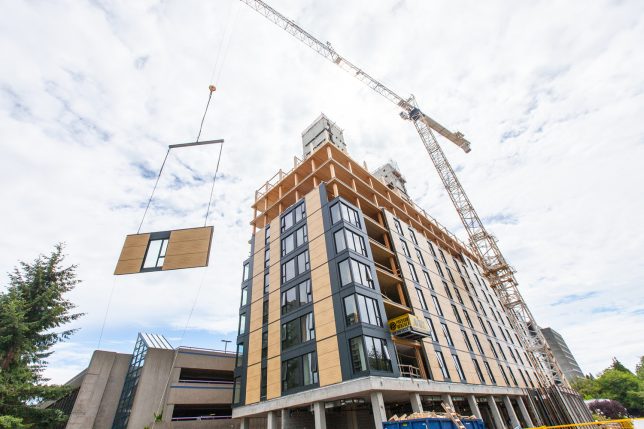
On the University of British Columbia’s campus in Vancouver, a new record-setting wood structures highlights the many advantages of a growing trend: vertical timber construction. Brock Commons Tallwood house is the highest of its kind to date, providing housing for over 400 students.
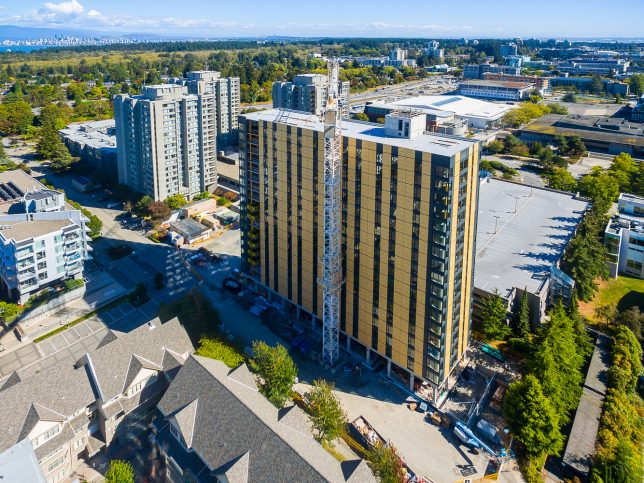
The Canadian firm behind its construction, Acton Ostry Architects Inc, says that using wood allowed for a much faster building process. Offsite testing of wood-to-wood connections and structural stability meant less time onsite spent figuring things out. Combined with prefabrication techniques, these approaches helped the builders finish the tower in just 70 days.
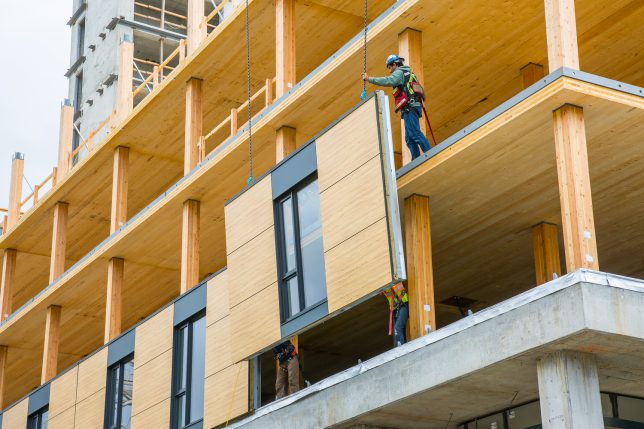
In addition to cost and time savings, wooden structures like this one are lighter weight, requiring less energy input during construction while also making them more flexible and resistant to earthquakes.
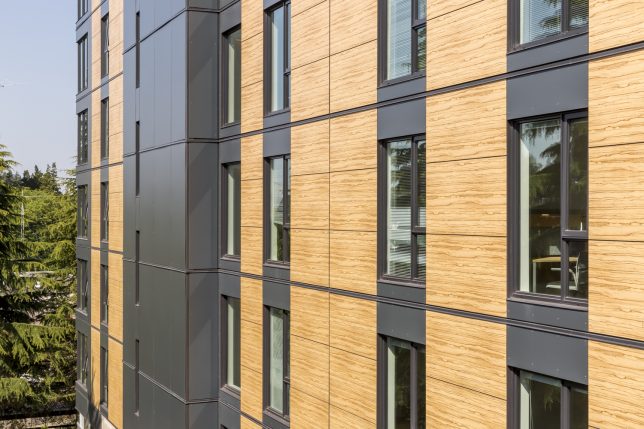
Sustainable forestry also enables them to sequester carbon while using a renewable resource — wood buildings like this open the door to carbon-neutral or even carbon-negative projects. Use of glue-laminated beams and columns also allows thinner trees and offcuts to be used in the construction process, reducing waste and growth time for harvested plants.
Some concrete was still required for the elevator cores, metal was needed for connections, and windows, of course, required glass. Still, compared to steel-framed structures, the amount of these materials used was dramatically reduced. And this project is not alone — around the world, forward-thinking architects and developers are beginning to realize that wood is a useful material for building tall.




[ By WebUrbanist in Architecture & Public & Institutional. ]
[ WebUrbanist | Archives | Galleries | Privacy | TOS ]
 |
The fortunes of Sony’s camera division have taken a turn for the better with a rise in first quarter sales and operating income for the period to June 30th. The company states in its latest financial report that higher value still and video cameras have helped it to achieve 27.3% year-over-year growth; however, that figure is inflated in part because the business was suffering the crippling effects of the Kumamoto earthquake this time last year.
Insurance payments from the earthquake have also artificially boosted operating income in both the camera and sensor businesses, with a 15.7 billion yen increase to 23.2 billion (an increase of 209%) in the camera sector and more than 41% growth in income for the sensor business compared to last year, thanks to booming smartphone sensor sales.
In fact, according to Bloomberg, as many as half of the world’s phones currently house Sony sensors. When you multiply that by as many as three sensors per phone—dual cam on the back, one on the front—you begin to understand that 41% growth figure.
Forecasts for the fiscal year ending March 2018 have been revised upwards for the imaging business, with sales expected to hit 650 billion against this year’s 579 billion. Sales of semiconductors are also expected to grow from this year’s 773 billion to 860 billion yen.
For more information see the Sony financial report on the company website.
Extracts from report:
Imaging Products & Solutions (IP&S)
Sales increased 27.3% year-on-year (a 26% increase on a constant currency basis) to 155.6 billion yen. This significant increase in sales was mainly due to the absence of the impact from the 2016 Kumamoto Earthquakes in the same quarter of the previous fiscal year as well as an increase in unit sales and an improvement in product mix reflecting a shift to high value-added models, both in Still and Video Cameras.
Operating income increased 15.7 billion yen year-on-year to 23.2 billion yen.
This significant increase was mainly due to the impact of the above-mentioned significant increase in sales, partially offset by an increase in selling, general and administrative expenses. Operating income for the current quarter included the above-mentioned 2.6 billion yen in insurance recoveries related to the 2016 Kumamoto Earthquakes. During the current quarter, there was no material impact from foreign exchange rate fluctuations.
Semiconductors
Sales increased 41.4% year-on-year (a 38% increase on a constant currency basis) to 204.3 billion yen. This increase was primarily due to a significant increase in unit sales of image sensors for mobile products, as well as the absence of the impact of a decrease in image sensor production due to the 2016 Kumamoto Earthquakes in the same quarter of the previous fiscal year, partially offset by asignificant decrease in sales of camera modules, a business which was downsized.
Operating income of 55.4 billion yen was recorded, compared to an operating loss of 43.5 billion yen recorded in the same quarter of the previous fiscal year. This significant improvement in operating results was primarily due to the impact of the above-mentioned increase in sales, the above-mentioned 27.5 billion yen gain resulting from the sale of the entire equity interest in SEH, and 6.7 billion yen in insurance recoveries related to the 2016 Kumamoto Earthquakes, as well as the absence of the 20.3 billion yen impairment charge against long-lived assets for camera modules and the net charges of 13.6 billion yen for expenses resulting from the 2016 Kumamoto Earthquakes recorded in the same quarter of the previous fiscal year. During the current quarter, there was a 2.5 billion yen positive impact from foreign exchange rate fluctuations.
Articles: Digital Photography Review (dpreview.com)
| Google Pixel’s HDR+ mode wows DxO in real-world use. Photo via DxOMark. |
The Google Pixel smartphone has just been launched but DxO has already had a chance to put the new device’s camera through its paces – with impressive results. With a DxOMark score of 89 the Google Pixel features the best smartphone camera ever tested by the French company.
 |
The DxO engineers found the new Google phone to perform well across all situations but were particularly impressed by the high levels of detail and relatively low noise levels across all light situations. Exposures were accurate, with very good contrast and white balance, as well as fast autofocus. The testers also liked the white balance performance and detail preservation when shooting with flash. Minor weaknesses included some inconsistency in repeated autofocus and artifacts in low-light shots. You can read the full report on DxOMark.com.
Articles: Digital Photography Review (dpreview.com)
[ By WebUrbanist in Architecture & Houses & Residential. ]

Wrapped in living greenery, the upper story of this solar-powered, tree-shaped dwelling branches outward, set upon a wooden framework supporting it from below.

Designed by Elevate Structure Inc. in Hawaii (photos by Corey Lum for Civil Beat), the 40-square-foot-base expands upward to a 400-square-foot second floor above, overhanging to provide shade for outdoor uses (patios or parking) underneath.

Eco-friendly features include living and breathing exterior walls that can also be used to grow edible produce, self-sufficient solar power generation via side and top panels and rainwater storage and collection (up to 1,500 gallons).

The modular structure was originally designed as an easy-to-ship, simple-to-build and off-the-grid solution for remote parts of Oahu, but the target has since been expanded due to broader public interest.

While they work wonderfully as elevated homes, the units can also be used for other purposes, including small stores, cafes, offices, gyms and/or storage spaces.
From its creators: “Inspired by Hawaii’s natural beauty, Elevate founders Tiffany and Nathan set out to create these innovative structures to help care for the environment and help people. The pressure of existing global issues – insufficient water availability in areas, poor air and water quality in others, and high energy consumption are exacerbated by the increasing population density and demands of urban environments – combined with their streak of entrepreneurship brought the Elevate unit to life.”




[ By WebUrbanist in Architecture & Houses & Residential. ]
[ WebUrbanist | Archives | Galleries | Privacy | TOS ]
[ By Steph in Architecture & Cities & Urbanism. ]

Fittingly enough for a city that’s all about sprawl, this hilltop village concept for Los Angeles combines residential and retail functions in a way that preserves the conventional house-and-yard format rather than stacking it all in a skyscraper. MAD Architects cover a retail building in vertical greenery to transform it into a hilly setting for a miniature neighborhood on its roof.

8600 Wilshire essentially distills the visual identity of Beverly Hills into a single development, clustering white living volumes with their own outdoor spaces atop high-end shops with exterior walls covered in succulents and vines. The complex includes three townhouses, five villas, two studios and eight condominiums, though from street level, you can only see the uppermost structures.

Made of white glass, the living volumes appear opaque from the street, but bear transparent facades facing an interior courtyard set on the roof of the single-story retail space. The green wall mimics both the city’s iconic hills and the tall privacy hedges seen around upscale houses, and replicating the established hierarchy found around the city: expense real estate above versus less-valuable property below. “In high-density cities, Modernist and Post-Modernist housing typically prioritizes functions and formats over human relationships to the environment,” say the architects. “For 8600 Wilshire, MAD considers the possibility of a new model for West Coast vernacular amid the sprawling density of Los Angeles. MAD purposes a harmonious architectural space of human experience by placing residents in the spiritual landscape of nature.”




[ By Steph in Architecture & Cities & Urbanism. ]
[ WebUrbanist | Archives | Galleries | Privacy | TOS ]
DxOMark has just released test results for Samsung’s latest flagship smartphones, the Galaxy S6 Edge and, by extension, the Galaxy S6. Both phones share the same hardware and specifications, including a 16MP BSI CMOS sensor, F1.9 lens and optical image stabilization. The S6 Edge’s camera performance puts it at the top of DxOMark’s mobile rankings – find out why. Read more
Articles: Digital Photography Review (dpreview.com)
[ By WebUrbanist in Architecture & Houses & Residential. ]
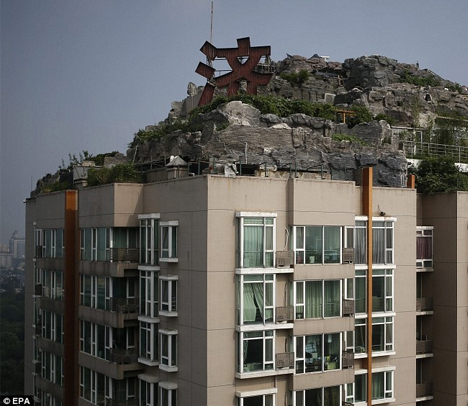
Over six years, one dedicated man has constructed his dream house, complete with boulders, trees, gardens, pools and ponds. It is the kind of luxury home you might expect expect to set into the side of an actual mountain … rather than perched atop an urban apartment building.
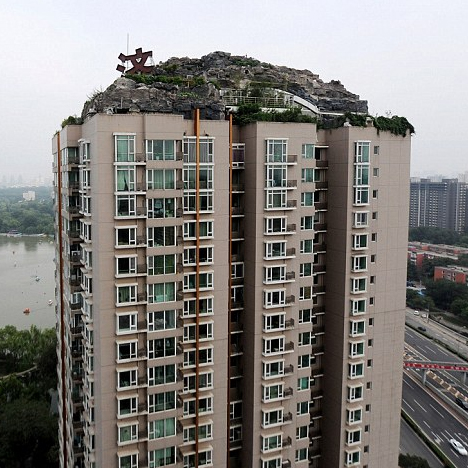
The Daily Mail reports that Chinese eccentric Zhang Lin slowly assembled this structure in Beijing despite disruptions and dangers caused to those residents below, apparently without planning permission and in defiance of zoning laws (not to mention common sense). The many tons of material required were hauled up the building, then transformed into a faux mountaintop. In turn, the industrious top-floor owner tucked his unique private penthouse retreat into the resulting rock face.
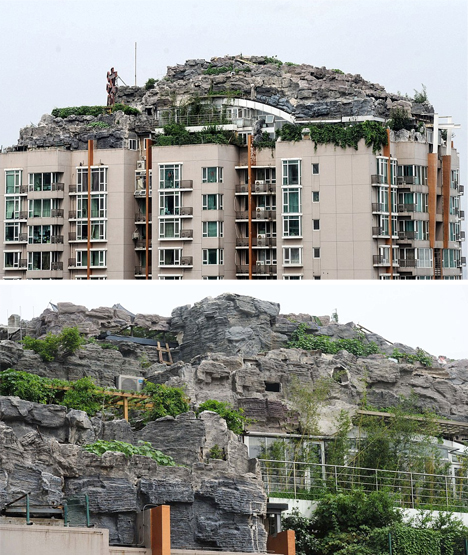
A number of residents have complained about the noise from construction, and one has experienced flooding, either from fake mountain pools and ponds above their place, broken drainage due to displaced infrastructure, or perhaps both.
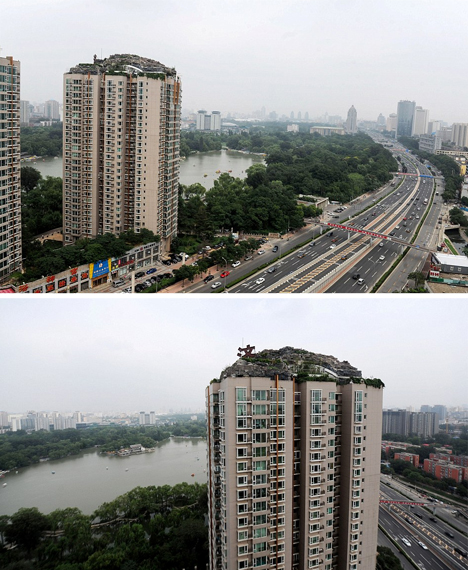
Meanwhile, the penthouse – originally slated to be a small shack added to the top – has sprawled in all kinds of creative and (to those below, at least) unexpected ways. There are various outdoor decks, viewing platforms and winding paths that make their way through and around the stone mountaintop and its outgrowths of greenery.
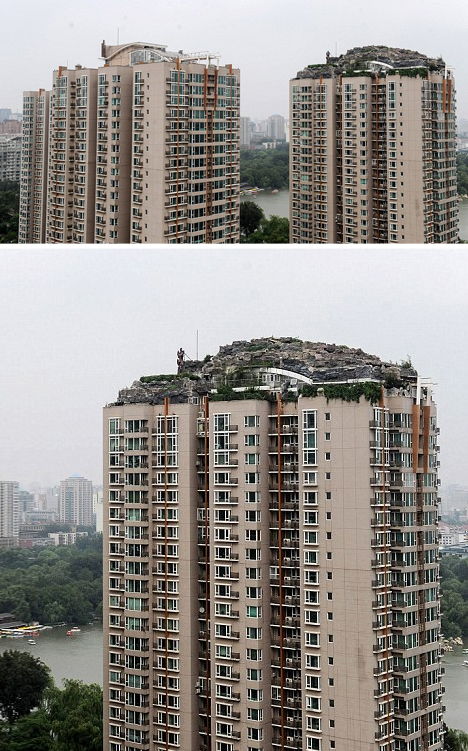
And what comes next? Well, no one in the city has stopped the project so far, but as complaints mount from other residents, and as the weight loaded on the roof grows, one has to wonder what will happen first: government intervention or a tragic structural collapse.




[ WebUrbanist | Archives | Galleries | Privacy | TOS ]
![]()
You must be logged in to post a comment.